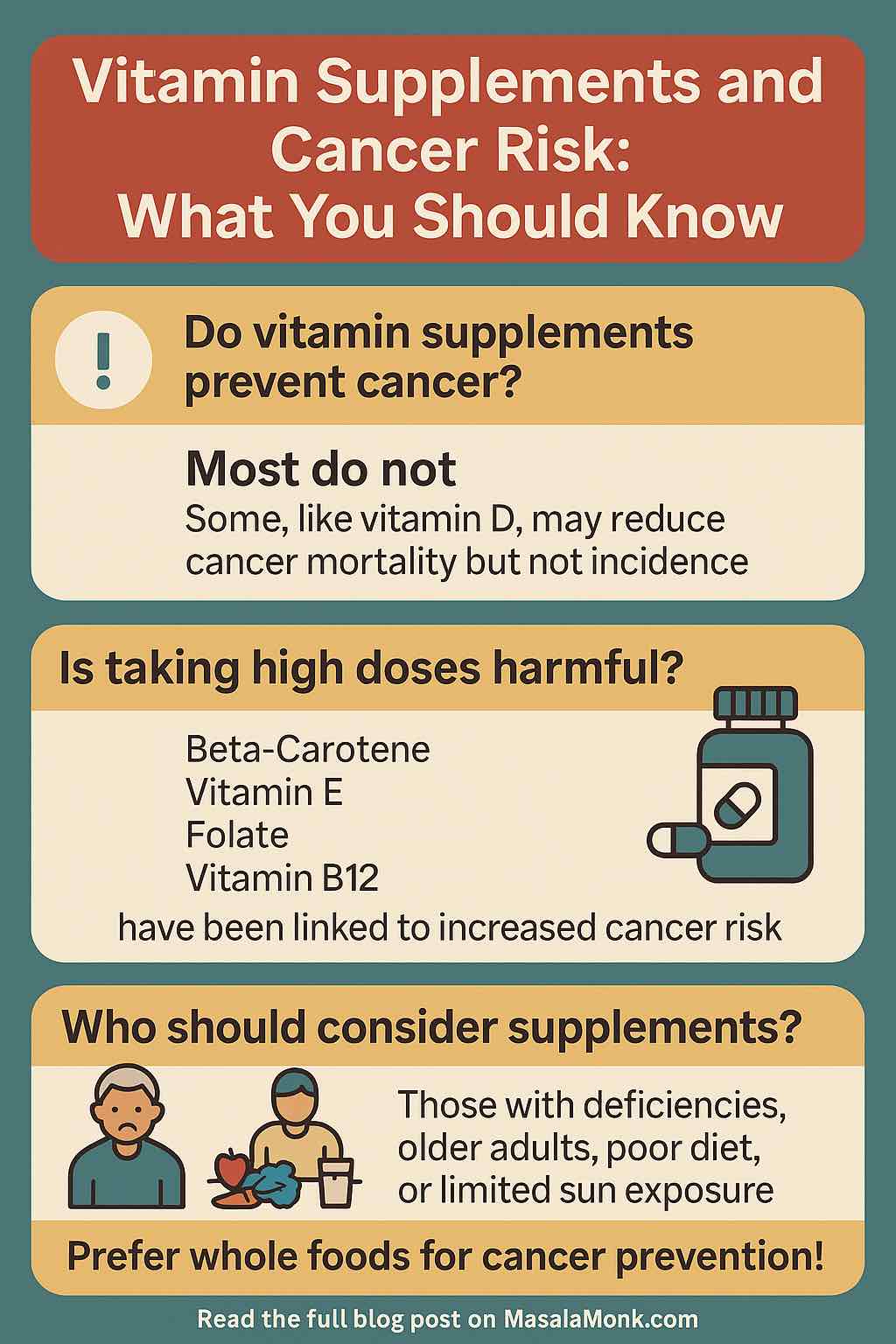
In today’s wellness-driven culture, vitamin supplements are practically ubiquitous. From multivitamins to high-dose vitamin D or trendy antioxidant pills, people reach for them with the hope of preventing chronic diseases like cancer. But what does the science actually say? Are supplements a reliable line of defense against cancer, or could they possibly do more harm than good?
This post dives deep into the latest scientific findings and provides you with practical, evidence-based guidance on how to think about vitamin supplements in the context of cancer prevention.
Section 1: The Allure of Vitamin Supplements The appeal of vitamins is rooted in their essential role in cellular health, DNA repair, immune function, and antioxidant defense. Observational studies often show associations between high nutrient intake and lower cancer risk, leading many to assume that more is better. But observational studies are prone to confounding variables: people who take supplements often also eat healthier, exercise more, and avoid smoking.
That’s where randomized controlled trials (RCTs) come in. Let’s look at what they say.
Section 2: What Does the Evidence Say?
Multivitamins
- Findings: A slight reduction in overall cancer incidence has been observed in some studies, notably the Physicians’ Health Study II, which reported an 8% reduction in cancer risk.
- Reality: The benefit is modest and not consistent across all populations.
- Bottom Line: May be beneficial in older adults or those with poor diets, but not a cancer cure.
Vitamin D
- RCT Meta-Analyses: Show no significant effect on cancer incidence, but a 12-13% reduction in cancer mortality with daily moderate doses.
- Mechanism: Supports immune regulation and may reduce tumor proliferation.
- Caveats: Benefits are more likely in those who are deficient. High-dose monthly “bolus” dosing is ineffective and may be harmful.
- Bottom Line: If deficient, correcting your vitamin D may reduce cancer mortality. Get your levels tested.
Beta-Carotene and Vitamin A
- Studies (ATBC, CARET): Show increased lung cancer risk in smokers taking high doses.
- Mechanism: Can act as pro-oxidants in high-oxidative environments like those found in smokers.
- Bottom Line: Avoid high-dose beta-carotene, especially if you smoke.
Vitamin E
- SELECT Trial: No benefit for prostate cancer prevention; a 17% increase in risk was found.
- High-Dose Risks: Doses >400 IU/day may increase all-cause mortality.
- Bottom Line: No cancer-preventive role; avoid high doses.
B Vitamins (B6, B9/Folate, B12)
- RCTs: No consistent reduction in cancer risk; some trials found increased colorectal cancer risk with high-dose folate/B12.
- Observational Data: Elevated B12 linked with increased cancer risk, particularly colorectal and lung.
- Bottom Line: Don’t supplement unless you have a deficiency.
Vitamin C
- Meta-analyses: No effect on cancer incidence or mortality.
- Public Belief vs. Reality: Despite its antioxidant properties, vitamin C doesn’t prevent cancer when taken as a supplement.
- Bottom Line: No strong evidence for or against; not recommended for cancer prevention.
Section 3: Key Takeaways for Everyday Life
- Whole Foods First
- A diet rich in vegetables, fruits, nuts, legumes, and whole grains is your best bet for getting cancer-protective nutrients.
- Whole foods offer synergy—nutrients working together in ways that supplements can’t replicate.
- Don’t Use Supplements as Insurance
- They’re not a substitute for a healthy lifestyle: regular physical activity, not smoking, and moderate alcohol use are proven cancer risk reducers.
- Avoid High-Dose Supplements Unless Directed by a Doctor
- Especially true for beta-carotene, vitamin E, and high-dose B vitamins.
- Test, Don’t Guess
- Before taking supplements like vitamin D or B12, get a blood test to see if you’re deficient.
- Multivitamins Are Not Magic
- At best, they may help fill nutritional gaps; at worst, they offer a false sense of security.
Section 4: Who Might Benefit from Supplements?
- Older adults: May need B12, D, or a multivitamin due to absorption issues.
- Vegans: Often require B12 and possibly D and iron.
- People with chronic illnesses: May need targeted supplementation based on individual deficiencies.
- People with limited sun exposure: Might benefit from vitamin D.
Conclusion: A Balanced Approach Wins The science is clear: vitamin supplements are not a silver bullet against cancer. While correcting a deficiency is essential, over-supplementation can be ineffective at best and harmful at worst. Focus on a whole-food diet, maintain a healthy lifestyle, and use supplements judiciously—not as your first line of defense.
When in doubt, talk to a healthcare provider and rely on blood tests to guide supplementation. And remember, prevention is multifactorial. There’s no pill that replaces sleep, exercise, good food, and stress management.
Further Reading and Resources
- USPSTF Guidelines on Vitamin Supplementation
- VITAL and SELECT Trial Summaries
- NIH Office of Dietary Supplements: https://ods.od.nih.gov
Stay smart. Stay skeptical. And stay healthy.
✅ 10 FAQs: Vitamin Supplements and Cancer Risk
1. Do vitamin supplements prevent cancer?
Answer: Most high-quality studies show that vitamin supplements do not prevent cancer. Some, like vitamin D, may slightly reduce cancer mortality, but supplements do not reduce incidence for the general population.
2. Is it safe to take multivitamins daily?
Answer: For most people, yes—especially if they have dietary gaps. However, multivitamins are not a guarantee against cancer and should not be used as a replacement for a healthy diet.
3. Can taking too many vitamins increase cancer risk?
Answer: Yes. High doses of beta-carotene (especially in smokers), vitamin E, folate, and vitamin B12 have been linked to an increased risk of certain cancers in clinical trials.
4. Should I take vitamin D to reduce cancer risk?
Answer: If you’re deficient, moderate daily doses of vitamin D may lower your risk of dying from cancer, but they do not reduce your chances of developing cancer. Always test your levels before supplementing.
5. Are antioxidants like vitamin C effective against cancer?
Answer: While vitamin C has antioxidant properties, clinical studies show no reduction in cancer risk or mortality when taken as a supplement.
6. What’s the problem with high-dose beta-carotene?
Answer: In smokers, high-dose beta-carotene supplementation increased lung cancer risk in major trials like ATBC and CARET. It may act as a pro-oxidant under certain conditions.
7. Who should consider taking vitamin supplements?
Answer: People with confirmed deficiencies, older adults, vegans, those with chronic illnesses, and individuals with limited sun exposure may benefit. Always consult a healthcare provider first.
8. Are there safer ways to get these vitamins?
Answer: Yes. A whole-foods diet rich in fruits, vegetables, whole grains, and lean proteins is the best source of nutrients. This approach reduces cancer risk through multiple synergistic effects.
9. Is bolus (high, infrequent) dosing of vitamin D safe?
Answer: No. Studies suggest that daily dosing is more beneficial and safer. Infrequent high-dose (bolus) vitamin D may offer no benefit or even increase risk in some cases.
10. Should I stop all supplements now?
Answer: Not necessarily. If you’re correcting a deficiency or have a medical reason, supplements can be helpful. But avoid high-dose, long-term use without guidance. Use supplements to fill gaps, not as a health shortcut.











